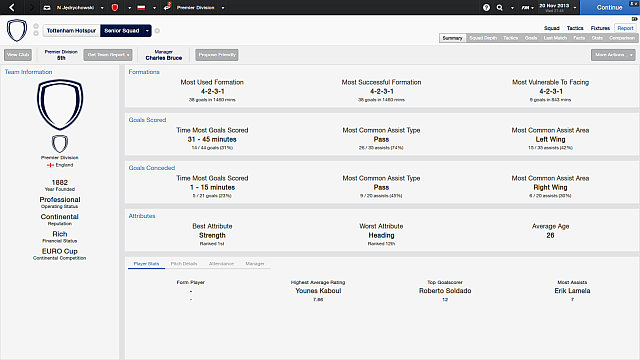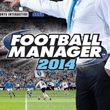Preparations | Match

Proper preparation for the match is essential if you want to win. You should know as much as possible about your opponent a few days before the match: his formation, best player, strongest side, what his players have for breakfast etc. You'll get this information from your scout's report, it's prepared before every match (if you tell at least one of your scouts to monitor your opponents).
Description of scout's information below.
Scout's report
1. Squad personality
It shows a description of all players with evaluation of their skills and opinions about them. You can also see what roles are assigned to specific players and compare them to your ones.
2. Tactics
Here you can see your opponent's strategy, how many goals they score and lose and a comparison to other strategies. You should take a look at formations against which they score and lose most goals.
3. Goals
This tab shows you information on the opponent's scored and lost goals. You can see how he shoots/loses and his assists. There's also a percentage of goals scored in several parts of the match (90 minutes divided into 6 15-minute periods). It can be really useful - for example, you should attack during a time in which your opponent loses most goals.
4. Last match
Here you can see a summary of your opponent's last match. There's the score, summary and assessment of individual players. You'll see how fit the opponent is. You should also check his last opponent.
5. Comparison
An important element where you can see a comparison of your and your next opponent's attributes. Take a look at formations to see what you can use to your advantage. Check if the opposition is rather tall or short to increase/decrease the amount of crosses and place your defence properly.
The last elements that you should check are weather, length and width of the field and the referee. Weather can influence the match - when it rains, you should try shooting from a distance and count on goalkeeper's mistakes. You can choose to play wide or narrow depending on the field's dimensions. About the referee, you should check how much cards he gives. If he's strict, you're risking a lot of fouls and cards.
Meeting with journalists
Meeting journalists before a match should keep your players' morale high and get you a mental advantage over your opponent. It's a good idea to discredit your opponent's best player's skills - it might make him nervous and play worse than usually. You should be optimistic. If the opposition have many good players, say something good about their coach. They'll feel overconfident and you'll bring them to the ground during the match.
Match training, squad, tactics
Remember to set up a good match training that should focus on the most important aspects of your team according to the opponent. When picking a squad, take a look at players with injuries or little fitness. Finally, choose a proper strategy, preferably from the ones that you practice.
You are not permitted to copy any image, text or info from this page. This site is not associated with and/or endorsed by the SEGA or Sports Interactive. All logos and images are copyrighted by their respective owners.
Copyright © 2000 - 2025 Webedia Polska SA for gamepressure.com, unofficial game guides, walkthroughs, secrets, game tips, maps & strategies for top games.
